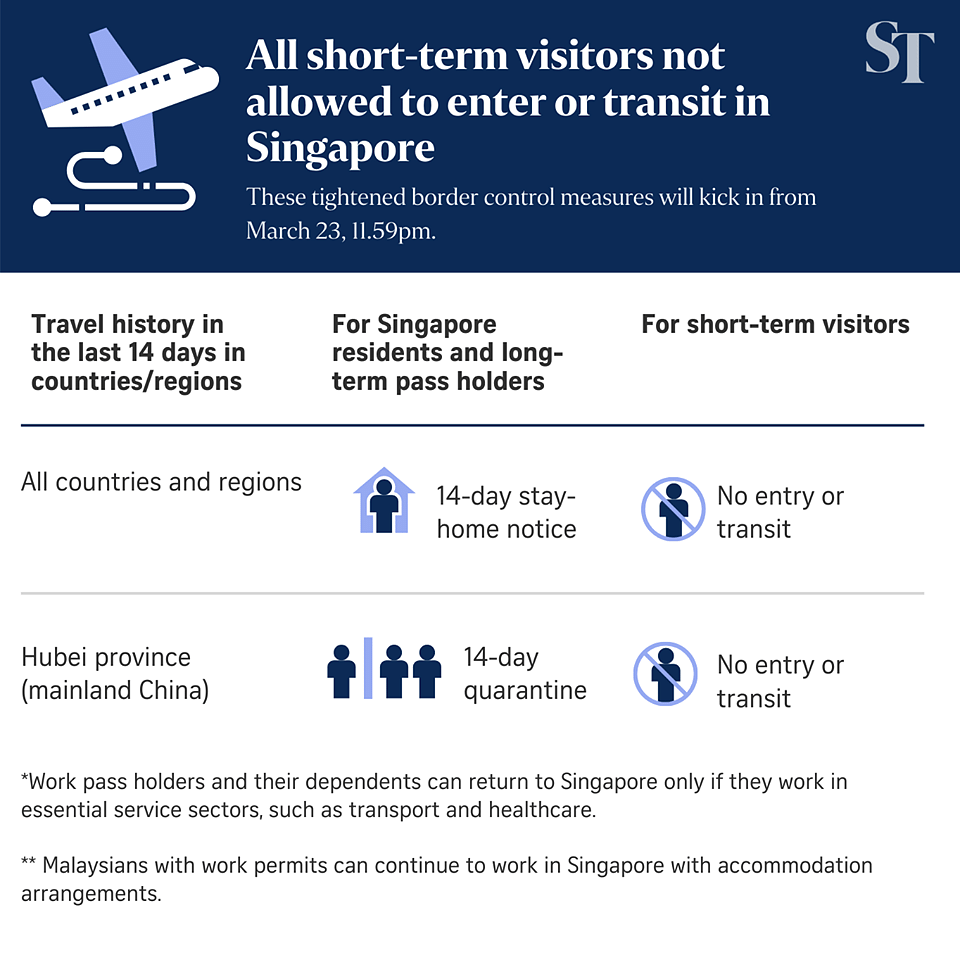SINGAPORE - Singaporeans and residents returning to the country will all have to serve a 14-day stay-home notice (SHN).
The move, which took effect on March 20, was among new measures announced to contain the spread of coronavirus cases. To date, Singapore has reported a total of 313 cases.
Here's what you need to know about SHN, based on the Ministry of Health advisory:
1. Am I under quarantine orders if I am on SHN?
No, you are not under quarantine orders and are not required to have a dedicated room and toilet if this is not feasible. However, you should remain in your place of residence at all times during the 14-day period.
2. What is the difference between leave of absence and SHN?
People taking leave of absence are allowed to leave their place of residence to purchase daily necessities or to attend to important personal matters.
Those issued a SHN should remain in their place of residence at all times during the 14-day period.
3. Can my family members continue to stay with me during this time? Are they at risk of infection?
Your family members may continue to live with you. However, you and your family should observe good personal hygiene practices. If you become unwell, avoid contact with your family members and seek medical attention immediately.
4. My family members/flatmates/tenants have just returned from one of the affected areas. Can I still carry on with my daily activities, such as going to work or school?
Yes, the SHN applies only to individuals who are served the notice. Nonetheless, you should continue to monitor your health, observe good personal hygiene and seek medical attention if unwell.
5. Do I need to declare to my employers/schools that I am on SHN?
Those who have returned from the affected areas are advised to inform their employers or schools that they are on SHN. This is so that your employer or school can provide the necessary assistance to facilitate your SHN.
6. If I am delivering food/supplies to a person under SHN, should I wear a mask or other protective equipment to protect myself?
There is no need for masks or other protective equipment. The delivery can be conducted in such a way as to minimise contact with the person under SHN. The SHN is a precautionary measure and persons under SHN are not close contacts of confirmed cases.
7. Can I send my employees/students to the doctor to get tested at the end of the 14-day period so that they can be cleared to come back to work/return to school?
It is not useful to send persons who do not have symptoms to the doctor/hospital for testing. Such individuals will not be offered diagnostic testing, and will be asked to return home.

8. What if I do not comply with the SHN?
If you fail to comply with the SHN, you may face the following penalties, as you have put the well-being of the wider community at risk:
a. You may be prosecuted under Section 21A of the Infectious Diseases Act.
b. If you are a Singapore permanent resident, long-term-visit pass holder, dependant's pass holder, or student's pass holder, your re-entry permit or passes may be revoked or the validity shortened.
c. If you are a foreign employee issued with a work pass, your work pass may be revoked.
d. If your child/ward is a full-time student attending a pre-school, school or other educational institution in Singapore, your child/ward might be subjected to disciplinary action, including suspension or dismissal.
For foreign students, this may include the cancellation of your child's/ward's student's pass or dependant's pass.
9. What if I require medical attention while on SHN?
For life-threatening cases such as cardiac arrest, active seizures, breathlessness, major traumas and stroke, please call 995 directly for assistance.
For non-emergencies (such as cough or fever, follow-up visits for chronic conditions, refilling of prescription, etc):
a. For Singapore citizens, permanent residents and long-term visit pass holders, you may contact the People's Association (PA) at 6344-8222. PA will assist you to make the necessary arrangements with the nearest Public Health Preparedness Clinic (PHPC) or GP clinic, or to arrange for a house call by a GP (for those with mobility issues).
Please inform the staff and doctor of your travel history and that you have been issued an SHN.
b. For students/pre-school students, you can seek assistance from your school or MOE/ECDA.
c. For foreign employees issued with a work pass, you should contact your employer.
10. If I am worried about my status (whether or not I am infected), can I go to a hospital or the National Centre for Infectious Diseases to get tested?
Diagnostic testing is available for symptomatic individuals who are admitted to hospital on suspicion of infection. If you develop a fever, cough or breathlessness, or are feeling unwell, you should seek medical attention. Your doctor will assess and refer you to the hospital if necessary.











